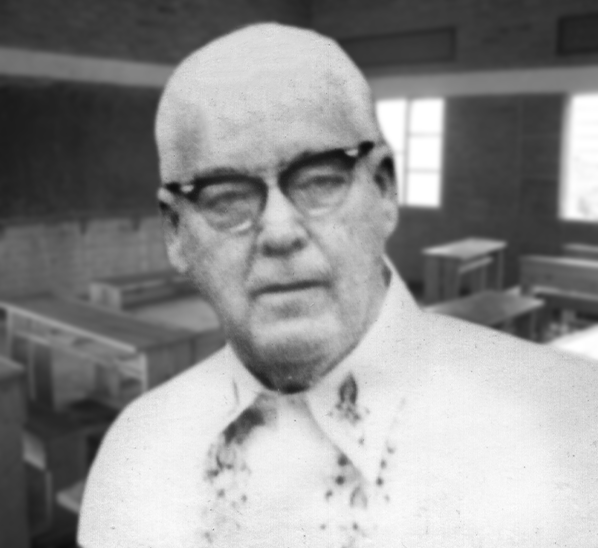Rapid urbanization, occurring on every hand today in Asia, drains from the countryside many of the energetic, able and ambitious young. Even most graduates from agricultural colleges do not go back to live on the land and apply their talents to its problems and potential. Rather they seek employment in government bureaus and private business. Rural villages, meanwhile, seem to stagnate.
WILLIAM F. MASTERSON was broadly prepared to apply himself to this challenge. Born in Brooklyn, New York, in 1910, he was schooled by the Jesuits. He joined the faculty of their leading educational institution in the Philippines, Ateneo de Manila, in 1933, devoting summers to leading boy scouts to Mindanao. Returning to the United States for theological studies and ordination, he became the wartime business editor of Jesuit Missions and raised more than US$4 million for postwar rehabilitation in the Philippines.
As Rector of Ateneo de Manila from 1947 to 1950, he reopened the College of Law and initiated a Graduate School and the Institute of Social Action. Yet amidst these constructive efforts, he saw the cities profiting at the expense of talents drawn from the countryside.
With his transfer to the now Xavier University in Cagayan de Oro, Fr. MASTERSON seized the opportunity, in 1953, to found a College of Agriculture designed to have the most immediate imprint on higher production and income of rural people. With this focus, extension work came to mean loving to live and work with farmers and organizing their economic strength through creation of viable cooperatives. Students today work in land titling, soil testing, feed and market analysis, on a seed production farm and an agricultural supply cooperative and they produce practical books, pamphlets and a radio series in Cebuano. Assistance to the College now comes from 14 countries. A telling result is that two-thirds of the graduates return to farming.
In 1964, supported by the German Catholic Bishops Fund and the German government, MASTERSON developed the Southeast Asia Rural Social Leadership Institute (SEARSOLIN) to give annually to 50 rural leaders from Asian countries eight months of intensive training in applied agriculture and organization of farmers. Some 450 have experienced this impelling rural indoctrination. They have come from Hong Kong, Indonesia, Khmer Republic, Korea, Laos, Macao, Malaysia, Micronesia, Oceania, Sri Lanka, the Philippines, Taiwan, Thailand and Vietnam. Most attend on scholarships, conditional on a pledge to return for at least three years to their rural communities.
In electing Rev. Fr. WILLIAM FRANCIS MASTERSON to receive the 1974 Ramon Magsaysay Award for International Understanding, the Board of Trustees recognizes his multinational education and inspiration of rural leaders prompting their return to and love of the land.
One year ago, in this same traditional setting, tribute was paid to the spirit and work of a man, truly and richly deserving of such valued recognition. Deeply I rejoiced at that honor, not only because he had been a student of mine 41 years ago, but also because he had long grown to be an inspiring friend and challenge. I refer to the recently deceased Benjamin Gaston, Ramon Magsaysay Awardee of 1973, and dedicated associate of the revered President Ramon Magsaysay. So many of the achievements of the Xavier University College of Agriculture Complex heralded today trace back to his vision of 25 years ago, one he so tirelessly and infectiously preached, a vision of the pressing need for a new type and a new breed of agriculturist, one both production-and-people oriented, one alike technically competent and socially dedicated, and also to his supremely confident belief that the fostering and nurturing of such a new breed was meant to be a major, historic, pioneering role of Xavier University.
Visions beget dreams which often, no matter how ridiculed, no matter how seemingly impossible from so many angles ”human and financial”have ways of coming true. Today the Ramon Magsaysay Award Foundation witnesses in a most singular way to the fact that the beliefs and programs of 13 students and a few staff in 1953 were not wholly quixotic. The effects are now felt in 14 nations of East and South Asia and in the Central and Southwest Pacific, and there are now some 800 alumni to champion the belief in the people their explosive potential in achieving for themselves and by themselves a life commensurate with every mans glorious nature.
But dreams, for transformation into raw reality, need more than out-hearted men. They need muscle, the building of which is not an overnight process, and often one calling for not a little blind faith. We of the Xavier University College of Agriculture Complex see in todays accolade a remarkable public recognition of the extra-ordinary blessings of which we have been the fortunate recipients from understanding, magnanimous people of 14 donor nations, not the least our own Philippines, and apart from which we simply would not be here today. Benefactions have totaled, believe me with no exaggeration, some 15 million pesos, including three and two-thirds million for 600 scholarships, one and two-thirds million in facilities.
Mr. Chairman, what merit your Foundation may have found in honoring the Xavier University College of Agriculture Complex really reflects glory on Ramon Magsaysay. For squarely in front of Xavier stands a vigorous, forceful Magsaysay, everyday daring us by the recollection of his vibrant example to a more meaningful concern for his special love, as he styled it, those who have less in life.
I assure you that the Award of today prompts vows of still greater consecration on the part of our Xavier University College of Agriculture and SEARSOLIN family, alumni, students, staff, and benefactors in the thousands, to our mission of bringing light, hope and a little more happiness to the groping millions of Asia who have honored us in welcoming our coming among them. We know of no other, better way to voice our grateful appreciation for the unique honor of today.

